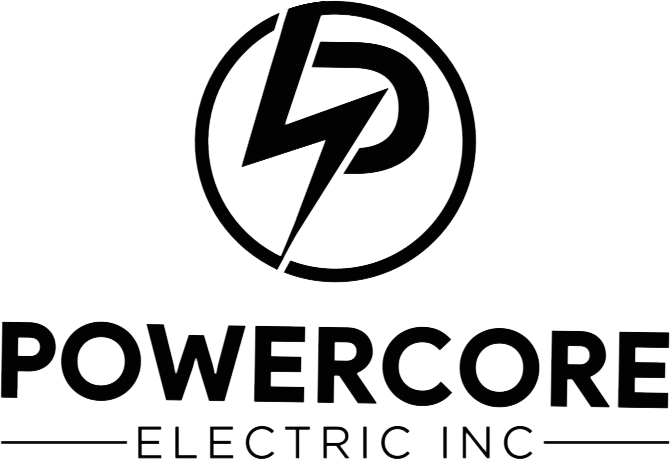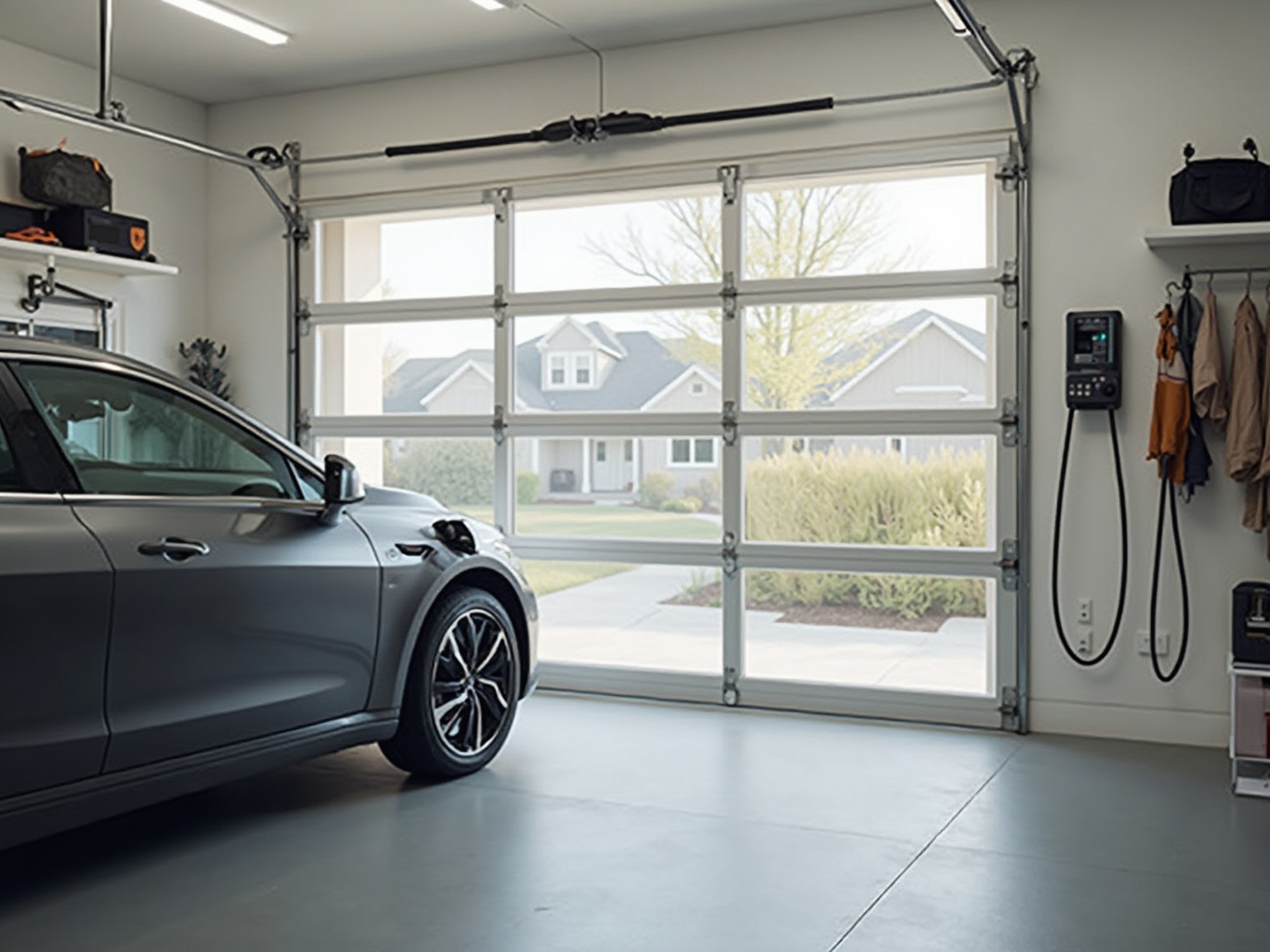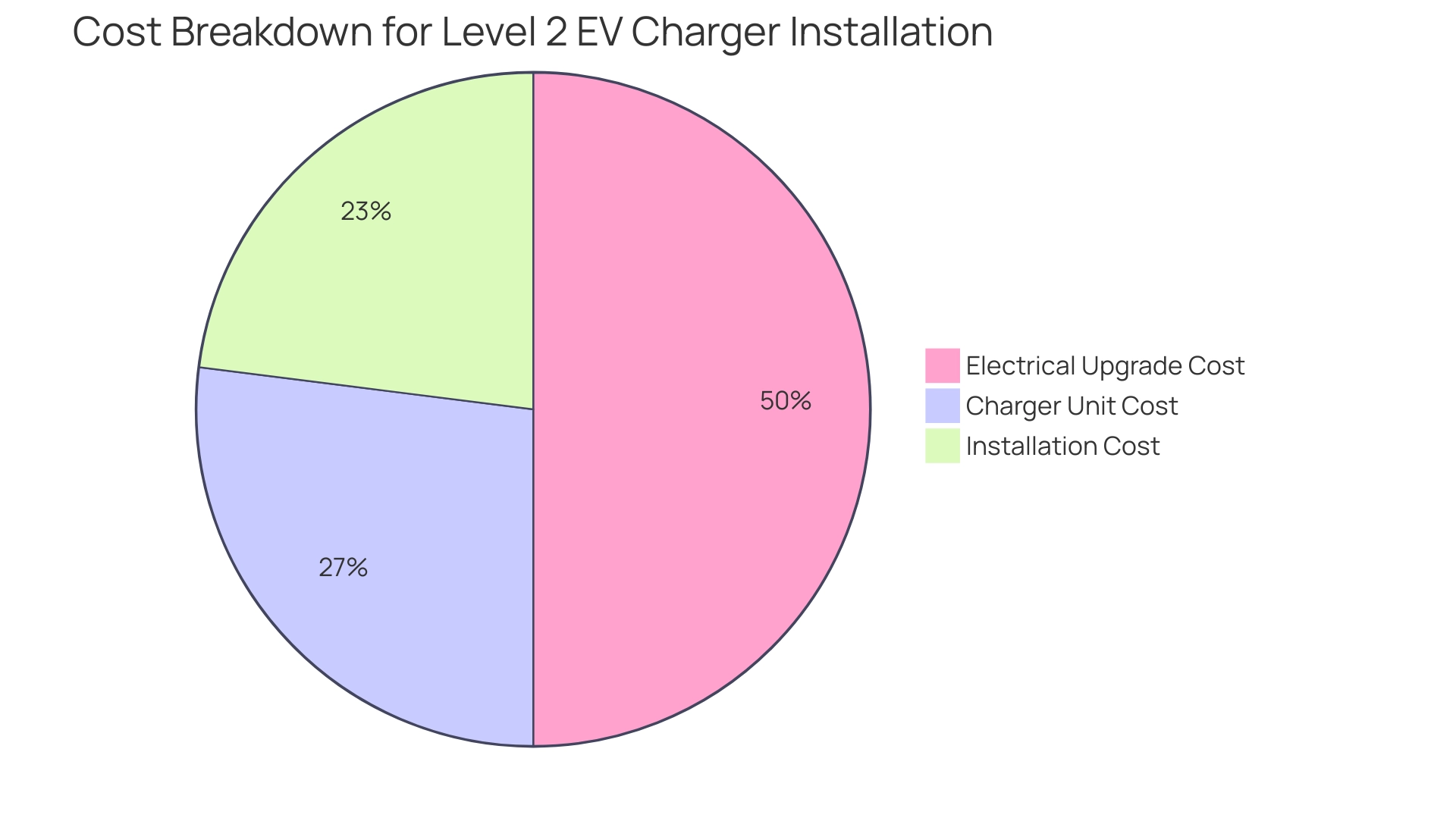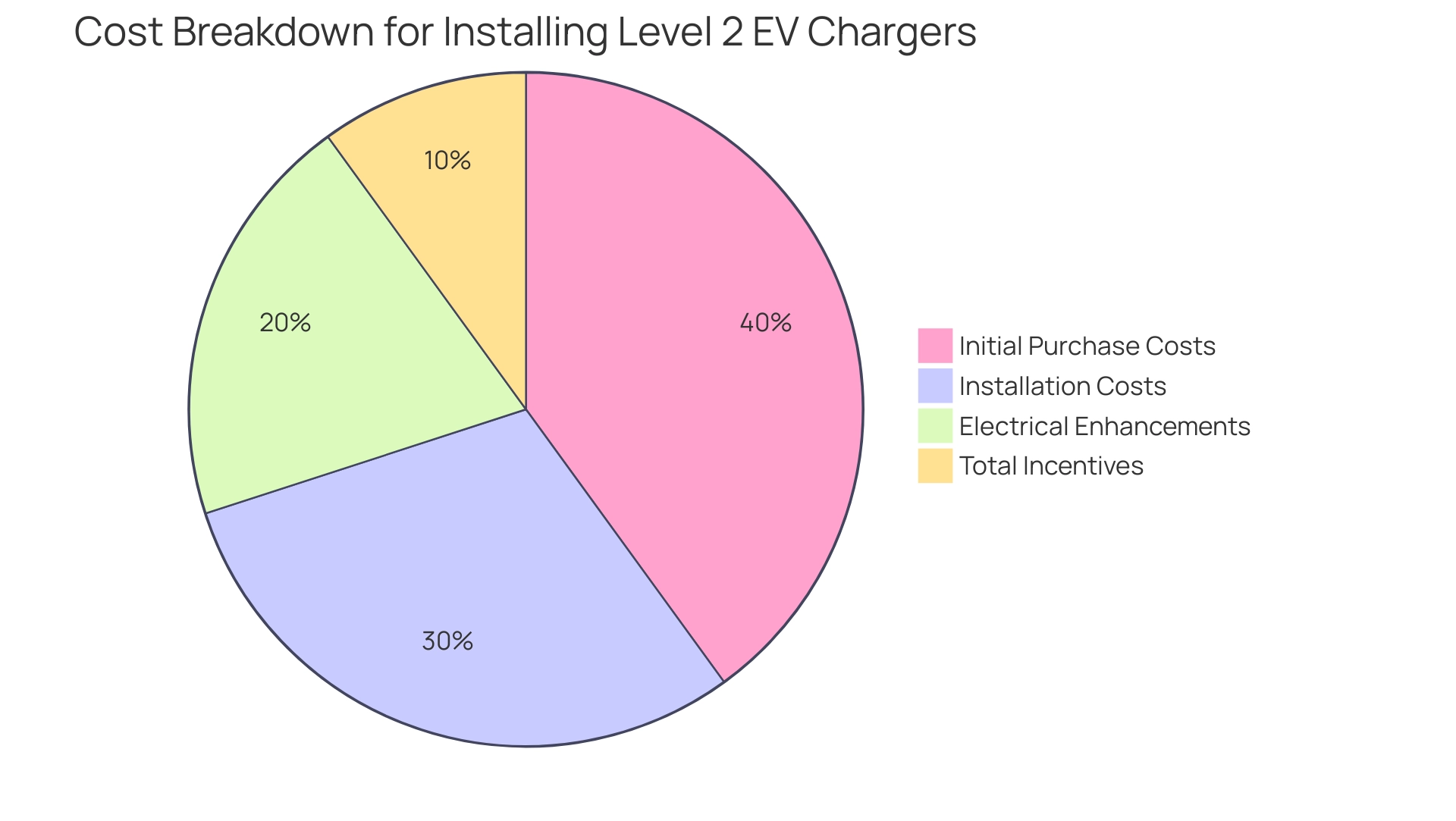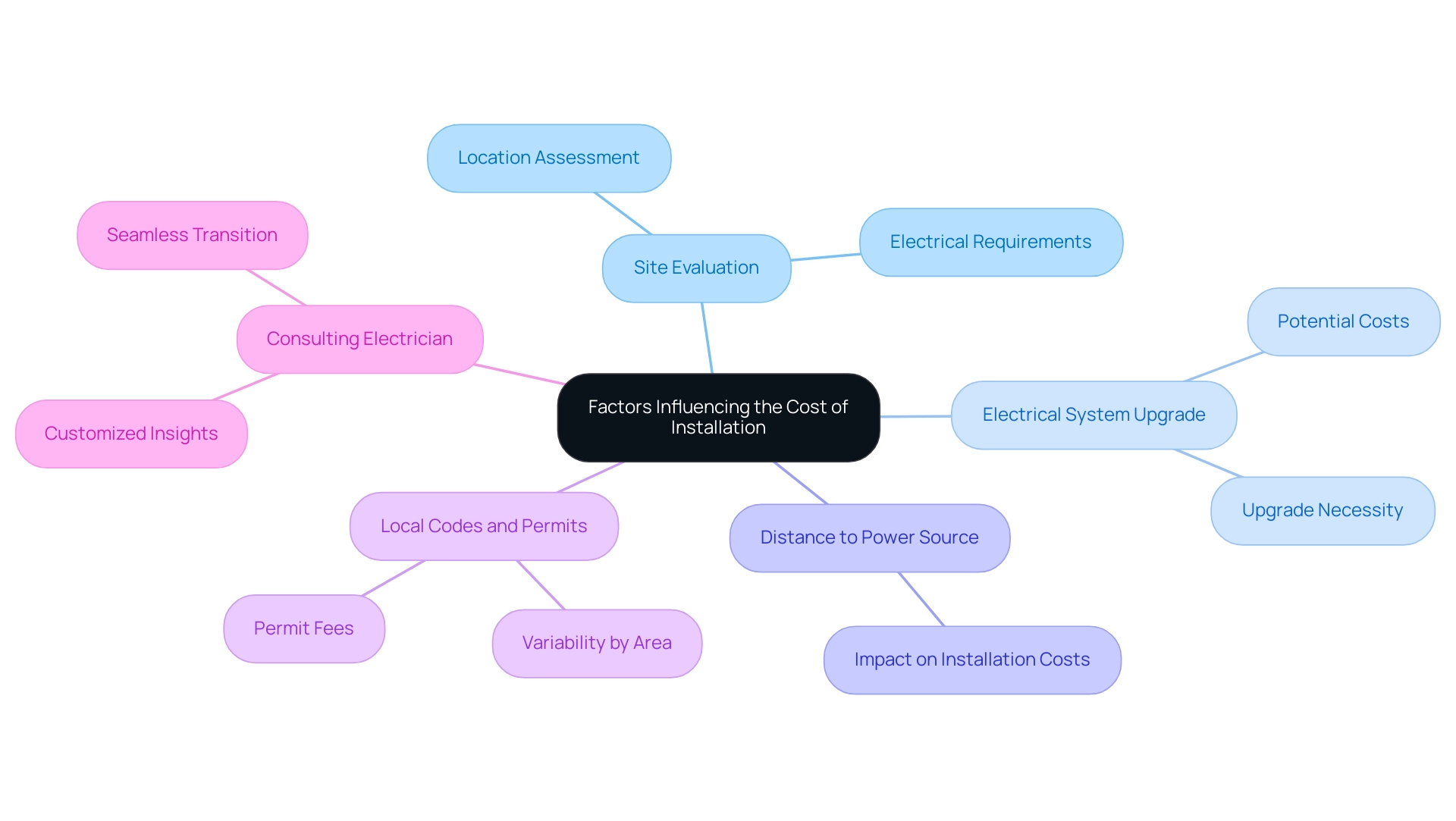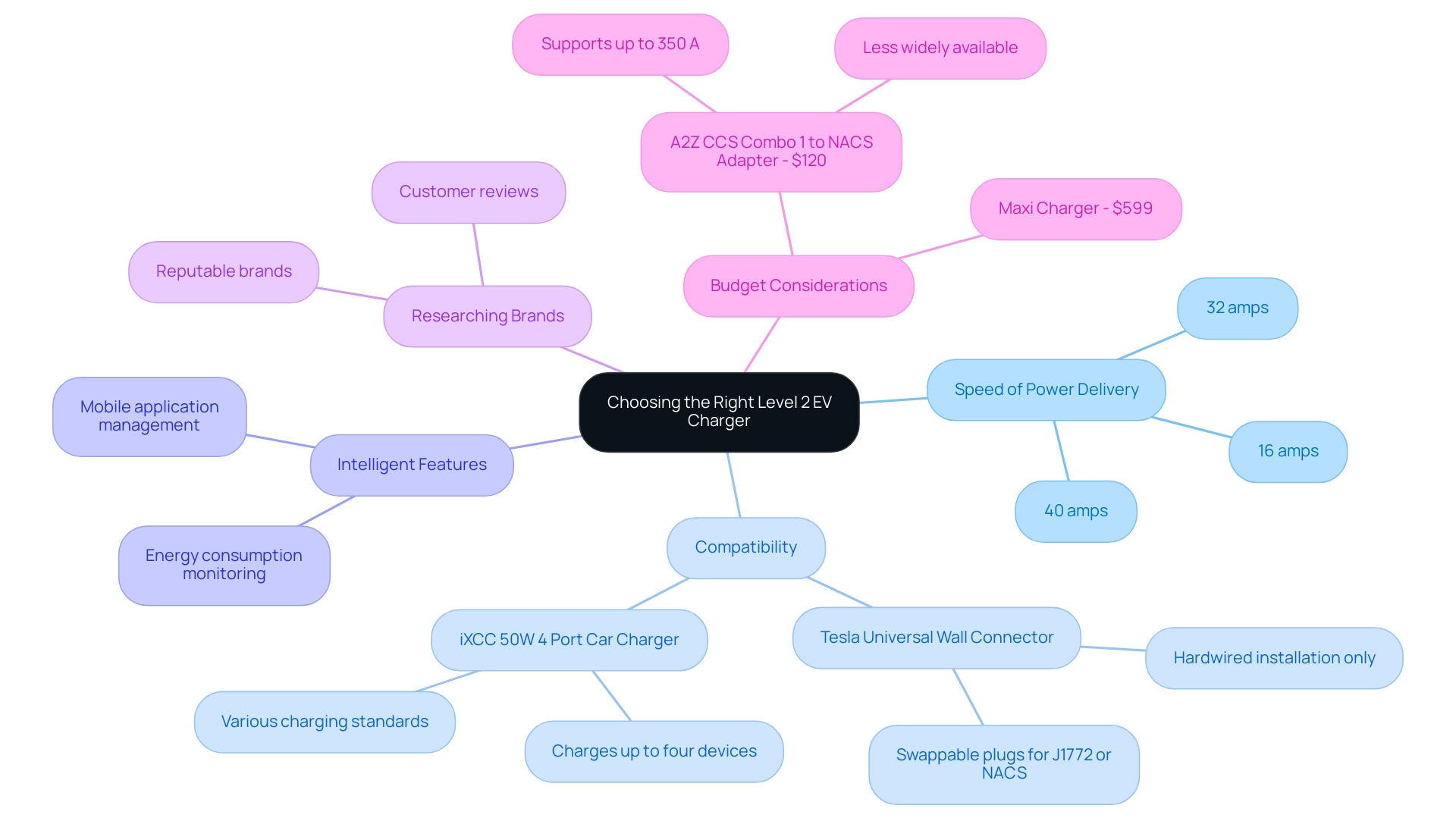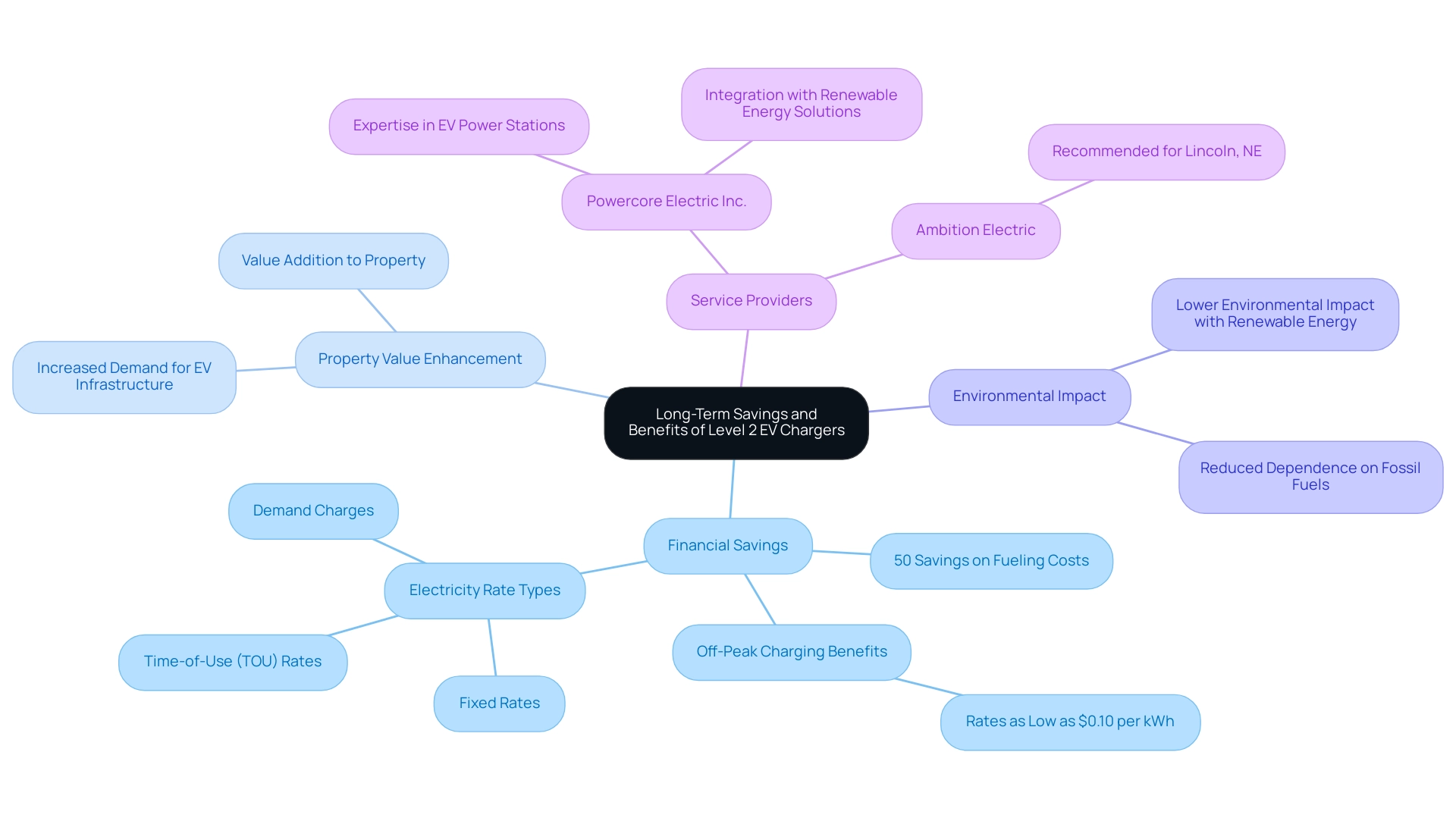Overview
The cost of a Level 2 EV charger typically ranges from $400 to $1,200 for the unit itself, with installation expenses averaging between $300 and $1,000, though upgrades to the electrical system can significantly increase costs. The article supports this by detailing various factors that influence these costs, such as the distance from the electrical panel and local labor rates, while also highlighting potential incentives that can alleviate some financial burdens for homeowners transitioning to electric vehicle charging.
Introduction
As electric vehicles continue to gain popularity, many homeowners are considering the addition of Level 2 EV chargers to their properties. But before diving into this investment, it’s crucial to understand the various costs involved, from the price of the charger itself to installation fees that can vary widely based on individual circumstances.
With the potential for significant long-term savings on energy costs and the added benefit of increasing property value, navigating this transition can feel overwhelming. However, with the right information and support, homeowners can make informed decisions that align with their eco-conscious goals and budget.
This article will explore the costs, additional expenses, incentives, and factors to consider when choosing and installing a Level 2 EV charger, empowering homeowners to embrace a greener lifestyle confidently.
Understanding the Cost of Level 2 EV Chargers
When considering purchasing a Level 2 EV charger for your home, you might ask how much is a level 2 ev charger, as the cost of the unit itself typically falls between $400 and $1,200. This variation depends on the brand, features, and power output you choose. Now, let’s talk installation—this is where things can get a bit tricky.
On average, you can expect to pay anywhere from $300 to $1,000 for professional setup. However, it’s important to note that if your electrical system needs an upgrade, expenses can exceed $3,000, particularly if permits are required. Factors such as your residence’s electrical setup, the distance from your electrical panel to the installation site, and local labor rates play a big role in determining your final cost.
It’s essential to factor in these variables as you budget for your EV charger, particularly in understanding how much is a level 2 ev charger, to ensure you have a clear picture of the overall investment needed. As Greg Sowder, President of Qmerit Network, highlights:
Rated #1 in customer satisfaction, Qmerit’s experienced network of certified electricians has installed more than 450,000 EV charging stations in residences and businesses throughout the U.S. and Canada!
This statistic not only highlights the reliability of professional services but also reassures you that you’re making a well-informed choice for your home.
Additionally, companies like Powercore Electric are committed to customer satisfaction and community service, making them a great partner in your transition to electric vehicles. Customers have praised Powercore Electric for their efficiency and professionalism, stating, ‘Ryan and his team were great. They were quick, effective, and adhered to the timeline for our solar setup.’
With the Australian Government announcing AUD 39.3 million to build EV stations along national highways and France proposing nearly 5,000 km of Electric Road systems by 2030, the landscape of EV charging infrastructure is rapidly evolving, making it a critical consideration for eco-conscious homeowners.
Ready to make the switch to electric vehicles? Contact Powercore Electric today for a quote and learn how we can help you embrace a cleaner, more sustainable future.
Additional Costs and Incentives for Installing Level 2 EV Chargers
When considering how much is a level 2 ev charger, it’s important to look beyond just the initial purchase and installation costs. Homeowners should also consider how much is a level 2 ev charger, as well as potential extra costs for required electrical enhancements to support the new device, which can vary significantly based on existing home infrastructure. Thankfully, there’s good news: many states and utility companies are stepping up to offer enticing incentives for installing Level 2 EV devices.
For example:
- Entergy’s eTech electrification initiative offers up to $250 for a Level 2 device.
- Dakota Electric Association enhances it with time-of-use incentives and rebates up to $500 for setup.
As highlighted by the White House, this incentive covers two-thirds of Americans, making it accessible for many. In California, various programs, such as the California Electric Vehicle Incentive Program, are designed to ease the financial burden of residential EV charger setups, helping homeowners make the transition to electric vehicles more affordable.
Additionally, Oklahoma’s NEVI Plan exemplifies state commitment to EV infrastructure, providing up to 80% funding for DC fast-charging projects, reflecting broader funding opportunities for homeowners. To truly maximize savings and minimize out-of-pocket expenses, it’s wise to explore local utility programs and state incentives tailored for 2024. By taking advantage of these offerings, eco-conscious homeowners can not only invest in sustainable technology but also enjoy significant cost savings.
Powercore Electric Inc. can help homeowners in navigating these incentives, providing services such as solar panel setups and battery backups that can operate seamlessly with your EV power system. For example, integrating solar panels can further reduce energy costs associated with EV charging. To learn more or get started, please contact Ryan Serrano at Powercore Electric Inc. at (916) 699-8778 or ryan.serrano@powercoreinc.net.
Factors Influencing the Cost of Installation
When contemplating how much is a level 2 ev charger, several key factors can affect the total expense. A comprehensive setup process begins with a thorough site evaluation by Powercore Electric, where we determine the best location for your charger and assess any electrical requirements. If your residence has an older electrical system, an upgrade may be necessary, potentially costing $1,000 or more.
Additionally, the distance from your main electrical panel to the desired power source location can impact installation costs. Local building codes and permit fees also vary significantly depending on your area, adding to the overall expense. Electric vehicle refueling is simpler than you imagine—it enables you to power your electric car securely and conveniently right at your residence, saving you both time and money.
According to data gathered from 6,628 sessions between 2015 and 2020, understanding how much is a level 2 ev charger is essential as this cost can influence the frequency and convenience of powering your vehicle. To navigate these considerations effectively, consulting with a qualified electrician is essential. They can offer customized insights into your particular circumstances, enabling you to make informed choices regarding your setup plans and ensuring a seamless transition to electric vehicle power at home.
Moreover, efficient organization for EV power supply systems is essential, as emphasized in the case study on Power Supply Infrastructure Organization, where authorities are prioritizing the setup of devices along highways to improve economic feasibility and prevent customer discomfort. Following setup, we perform thorough testing and commissioning to guarantee the device operates at peak efficiency. Our extensive electrical installation services also encompass safety inspections, circuit setups, and surge protection, guaranteeing that your residence is fully prepared for electric vehicle use.
Choosing the Right Level 2 EV Charger
When it comes to selecting the appropriate Level 2 EV station for your home, there are several important factors to keep in mind. First off, the speed of power delivery can vary significantly, with devices typically providing energy from 16 to 40 amps. Opting for a higher amperage can lead to faster charging times, which is a definite plus for busy households.
For instance, the ICC 50W 4 Port Car Charger is a great option if you need to charge multiple devices with various standards, according to Nick Guy. It’s also crucial to ensure that the device you select is compatible with your specific electric vehicle model; after all, you want to make sure it fits seamlessly into your EV lifestyle. For example, the Tesla Universal Wall Connector allows for swappable plugs to charge either J1772 or NACS vehicles, but it’s limited to hardwired installation, which may not suit everyone.
Beyond basic functionality, many contemporary power devices provide intelligent features that allow you to monitor your energy consumption and manage power times through a mobile application. This not only adds convenience but can also help you save on energy costs. Don’t forget to do your homework—researching reputable brands and diving into customer reviews can make a world of difference in helping you make an informed decision.
A concrete example is the Maxi Charger, which is priced at $599, providing insight into how much is a level 2 ev charger for your budget considerations. With the appropriate power supply, you’ll not only support a more sustainable planet but also improve your household’s capabilities.
Long-Term Savings and Benefits of Level 2 EV Chargers
Investing in a Level 2 EV charger at home not only provides the convenience of faster power replenishment but also leads to the consideration of how much is a level 2 ev charger in terms of significant long-term savings on energy expenses. Homeowners can save up to 50% on fueling costs compared to public stations, especially when utilizing off-peak rates that can be as low as $0.10 per kWh. By understanding the regional variations in electricity rates—such as fixed rates, time-of-use (TOU) rates, and demand charges—eco-conscious homeowners can optimize their power usage schedules to minimize expenses.
A case study, ‘Electricity Rate Types for EV Charging,’ highlights how charging during off-peak hours can lead to substantial savings, enhancing the attractiveness of residential charging solutions. Moreover, the setup of a Level 2 station can enhance your property’s worth, highlighting the question of how much is a level 2 ev charger in terms of the demand for electric vehicle infrastructure in the current market. As Sam Ashrafi observes, ‘Investing in a charger, such as how much is a level 2 ev charger, not only saves money but also adds value to your property.’
For a dependable arrangement, homeowners can rely on reputable firms such as Powercore Electric Inc., which focuses on effective setups of EV power stations, solar panels, and battery backups in Northern California. By selecting Powercore, you guarantee a setup that optimizes the advantages of residential power supply. Additionally, a Level 2 charger helps reduce dependence on fossil fuels, aligning with a commitment to environmental sustainability.
This means that homeowners can not only save money but also contribute to a greener future, making the switch to home charging a win-win situation. Compared to other providers, Powercore Electric Inc. stands out for its comprehensive support and expertise in integrating electric cars with renewable energy solutions, ensuring that homeowners can fully leverage the advantages of sustainable living.
Conclusion
Investing in a Level 2 EV charger brings numerous benefits that extend beyond initial costs, making it a wise choice for eco-conscious homeowners. Understanding the price of the charger itself, which can range from $400 to $1,200, along with installation costs that can vary significantly based on your home’s electrical setup, is crucial. The potential need for electrical upgrades can elevate costs, but being informed about these factors allows for better budgeting and planning.
Moreover, homeowners can take advantage of various incentives and rebates offered by states and utility companies, which can significantly offset expenses. Programs like Entergy’s eTech electrification initiative or California’s Electric Vehicle Incentive Program are designed to make this transition more affordable. By exploring these options, homeowners can enjoy both savings and the satisfaction of contributing to a more sustainable future.
Choosing the right Level 2 charger involves considering factors such as charging speed and compatibility with your vehicle. With the right selection, not only does home charging become more efficient, but it also enhances property value and provides long-term savings on energy costs. Embracing this technology aligns with a commitment to reducing dependence on fossil fuels and promotes a cleaner environment.
In summary, the transition to a Level 2 EV charger is not just an investment in a home upgrade; it’s a step towards a greener lifestyle that offers financial benefits and increases property value. By staying informed and leveraging available resources, homeowners can confidently navigate this exciting change and contribute positively to their communities and the planet.
